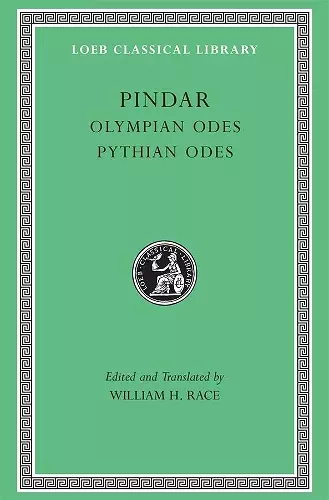Olympian Odes. Pythian Odes
Pindar author William H Race editor
Format:Hardback
Publisher:Harvard University Press
Published:15th May '97
Currently unavailable, and unfortunately no date known when it will be back

The preeminent lyric poet of ancient Greece.
Of the Greek lyric poets, Pindar (ca. 518–438 BC) was “by far the greatest for the magnificence of his inspiration” in Quintilian’s view; Horace judged him “sure to win Apollo’s laurels.” The esteem of the ancients may help explain why a good portion of his work was carefully preserved. Most of the Greek lyric poets come down to us only in bits and pieces, but nearly a quarter of Pindar’s poems survive complete. William H. Race now brings us, in two volumes, a new edition and translation of the four books of victory odes, along with surviving fragments of Pindar’s other poems.
Like Simonides and Bacchylides, Pindar wrote elaborate odes in honor of prize-winning athletes for public performance by singers, dancers, and musicians. His forty-five victory odes celebrate triumphs in athletic contests at the four great Panhellenic festivals: the Olympic, Pythian (at Delphi), Nemean, and Isthmian games. In these complex poems, Pindar commemorates the achievement of athletes and powerful rulers against the backdrop of divine favor, human failure, heroic legend, and the moral ideals of aristocratic Greek society. Readers have long savored them for their rich poetic language and imagery, moral maxims, and vivid portrayals of sacred myths.
Race provides brief introductions to each ode and full explanatory footnotes, offering the reader invaluable guidance to these often difficult poems. His Loeb Pindar also contains a helpfully annotated edition and translation of significant fragments, including hymns, paeans, dithyrambs, maiden songs, and dirges.
[A] translation which is modern, accurate, streamlined, and comprehensible… [which preserves], with a surprising degree of success, a sense of Pindar’s artful word order… He may well have produced the best text available… In many respects Race’s edition of the fragments will be even more useful than Snell-Maehler… A landmark contribution. -- Thomas K. Hubbard * Bryn Mawr Classical Review *
This excellent Loeb edition of Pindar supersedes the antiquated volume edited by Sandys in 1915. Its most notable feature is clarity: the Greek typeface is a pleasure to read; the translations are crisp and accurate… plentiful notes both explain Pindar’s recherché allusions and bring out how more than one interpretation of the text is often possible… This edition will be of lasting value. -- Stephen Instone * Classical Review *
Race succeeds admirably in furnishing the text and translation with a concise and helpful introduction, thereby elucidating the social and literary background of the poems that follow. Each poem is also accompanied by a succinct introduction and summary. The accompanying index and genealogies are invaluable study aids for students of myth from the primary sources. Most importantly, Race has achieved his aim of creating a readable translation which follows the familiar Loeb format—a feat of considerable ingenuity in the case of Pindar… Race devotes a significant portion of his introduction to a crisp and detailed analysis of the epinikian genre. Technical issues in Pindar’s composition of the Odes are equally effectively dealt with… Undergraduates tackling the complexities of this author for the first time will clearly find this volume essential. The more mature devotee will also benefit, thanks to the user-friendly scholarship of these volumes, from a day or two at the races with Race. -- John Weeds * Joint Association of Classical Teachers Review *
ISBN: 9780674995642
Dimensions: 162mm x 108mm x 20mm
Weight: 318g
416 pages